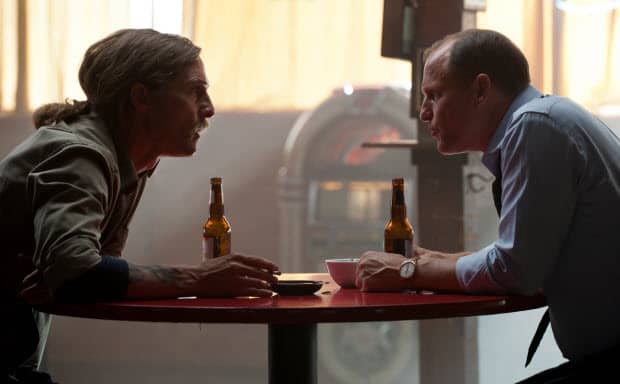
Whether it’s on the wall of his storage locker or representative of his general state of life, the spirals surround and haunt Rust Cohle. For nearly twenty years, he’s returned to the same case over and over, theories growing larger and larger, until he’s describing his hypothetical “sprawl” to a reluctant Marty Hart in “After You’ve Gone”. And as the case gets bigger and more conspiratorial in nature, the more intensely Rust is focused on the past, spiraling inward as the investigation (now completely off the books, ever since Rust returned from eight years in Alaska). And by the end of “After You’ve Gone”, it appears Rust is ready to let the spiral consume him, putting an end to the violent, “circular f*ck-up” of his life.
The visual metaphor haunting Rust even applies to the narrative path of “After You’ve Gone”; from the moment Marty and Rust leave the bar and head to his storage locker, the episode turns into a massive information dump on both Rust’s investigation, and the two men’s lives since their fight in 2002. It’s a tall task for the penultimate hour of the show, and although there’s certainly progression to the narrative, there’s an uncanny amount of focus on the investigation that previous episodes just weren’t concerned with.
There are so many dots to connect, so many revolutions to make around the same central point (the man with the facial scars) to create the narrative spiral, that it’s hard to keep up: for once, it feels like we’re occupying Marty’s shoes as the audience, rather than Cohle’s perspective, as he runs on about Tuttle’s schools, the 1988 molestations, and the many, many accusations he reserves for the Tuttle family line. At this point, a lot of this information is creepy (highlighted by the unseen footage on Tuttle’s video, which Rust refuses to watch again, and disgusts Marty viscerally) – but this isn’t the important journey of the show; that was always with our two central characters, journeys only referred to in “After You’ve Gone”, save for the extremely unsettling flashback detailing Marty’s last case as a homicide detective before turning P.I.
With that entire decade being glossed over, “After You’ve Gone” becomes solely about the investigation, turning the episode into a standard “chase the elusive carrot” drama, chasing down family members, local blue collar types, and lying to former bosses to bring them closer to the “man with the scars”, the ghost of a man Cohle’s been hunting 24/7 since returning to Louisiana in 2010. Problem is? It’s just not very interesting at this point: the larger the cover-up gets, and the more True Detective builds said cover-up, the less the investigation becomes about the characters, the forward motion of the plot overshadowing any attempts at the same with their characters.
The only time “After You’re Gone” stops to consider the lives of Marty and Rust is over a quick montage of images paralleling their daily lives in the modern world; both of them alone, sitting around in a pile of regrets and alcohol, consumed by the feeling they’ve flushed their lives down the toilet (again with the spiraling) with their mistakes, pulled down into the darkness of Louisiana’s bayou and their own minds. All of this is already a given, though; and without much new ground to tread in the way of its characters, “After You’ve Gone” itself becomes consumed by the Lange/Tuttle investigation’s details, a long trail that certainly has intriguing moments when it comes to Rust and Marty’s relationship (and in detailing how alone they’ve both become), but lacks some of the philosophic and spiritual explorations (debates often framed by Rust and Marty’s behavior) that made the previous hours so engaging and original.
Other thoughts/observations:
– Marty: “Father Time has its way with us all.”
– Rust visits a man named Toby, a former Tuttle student turned prostitute who remembers men in animal masks, Scarred Face, and feeling paralyzed while people took pictures and “did other things”.
– Marty and Rust briefly consider alternative paths for their lives: Marty wanted to play football, while Rust fancied himself as a painter.
– Louisiana police departments in True Detective not only have binders full of women, but boxes and rooms full of them, thanks to a barebones computer database.
– Rust: “She made sense to me.” “That should worry you, mister.”
– so we can stop with the “Rust and/or Marty is the killer!” theories now, right? Please?
– I do not want to be part of any sentence coming out of Rust’s mouth, that also involves the word “car battery and jumper cables”. No thank you.
– Rust, to Maggie: “Now get out of here; you’re classing the place up.”
– “My family’s been here a long, long time.”
[Photo via Lacey Terrell/HBO]




